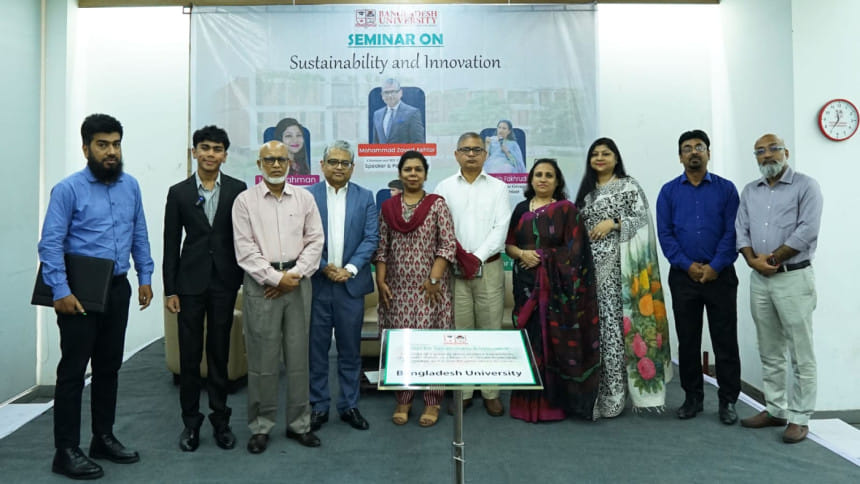Bangladesh University inaugurates ‘Center for Sustainability & Innovation’

The Department of Business Administration at Bangladesh University organised a seminar titled "Future of Sustainability and Innovation" on Saturday (August 2) as part of its Industry-Academic Week.
Alongside the seminar, the university also officially inaugurated the Center for Sustainability and Innovation, the first of its kind in Bangladesh, says a press release.
A student-led initiative bridging environmentally responsible economic growth with cutting-edge innovation, it marks a pivotal stride toward a more sustainable and resilient Bangladesh. The event took place at the university's permanent campus hall and was moderated by Faraz Islam, environmental researcher & Bangladesh's youngest ever conservation writer.
The panel of speakers included Zaved Akhtar, Chairman & Managing Director of Unilever Bangladesh; Lopa Rahman, ESG Project Lead for South Asia at IFC; and Shamarukh Fakhruddin, Director of Urmi Group.
In his keynote speech, Zaved Akhtar emphasised that sustainability has become a critical priority across all sectors - be it banking, industry, or services. "To be future-ready, we must step out of our comfort zones, make bold decisions, and take ownership of our lives. Sustainability is no longer the job of a single department but has to be embedded across business functions for any organization to grow. He emphasized life-long learning and personal resilience as key attributes needed by tomorrow's managers," he said.
Lopa Rahman highlighted the need to shift our mindset when it comes to sustainable development. "It's not only about business profitability. Social responsibility, environmental respect, and employee safety must also be ensured. Technology can play a vital role in achieving this transformation—especially in Bangladesh, where the youth are exceptionally capable of innovation and problem-solving. Transparency and equity across every stage of the supply chain are imperative," she noted.
Shamarukh Fakhruddin, Director of Urmi Group, said, "To stand out, one must be willing to leave the comfort zone. It takes courage to make decisions—and contentment in those decisions is crucial. When I left Unilever, many said it was a mistake. But I have no regrets—it gave me the opportunity to grow with new skills and experiences." She further added, "In today's competitive landscape, teamwork, collaboration and progress towards a common goal are essential."
In his remarks, Faraz Islam emphasised that the world faces a massive shortfall in sustainability funding, stating, "We need over $4 trillion a year – but we've committed barely a quarter of that." He argued that this gap demands innovation, not inertia: "We can't outspend the crisis, but we can outsmart it." His speech called for bold, locally grounded solutions that make sustainability both achievable and affordable.
Shahnila Azher, Member of the Board of Trustees and Advisor to the Business Administration Department at Bangladesh University, said, "Sustainability and innovation are among the most critical issues of our time. By bridging education, industry, and society, we can build a future that is environmentally conscious, inclusive, and development-driven. At Bangladesh University, we aim to prepare our students with the skills and mindset necessary not only to succeed in their careers but to create meaningful change in society. This seminar is an important step toward that vision."
In his welcome speech, Professor Dr. Mozakkerul Huda, Head of the Department of Business Administration, said, "Sustainable development is a balanced approach where the economy, environment, and society complement one another."
The event concluded with the formal inauguration of the Centre for Sustainability and Innovation by Professor Dr. Md. Jahangir Alam, Vice Chancellor of Bangladesh University.
The center – established with the leadership of Faraz Islam – will promote a green economy in Bangladesh, connecting sustainability efforts across agriculture, infrastructure, and industry.
The seminar ended with an interactive Q&A session between the participants and panelists.

 For all latest news, follow The Daily Star's Google News channel.
For all latest news, follow The Daily Star's Google News channel. 



Comments